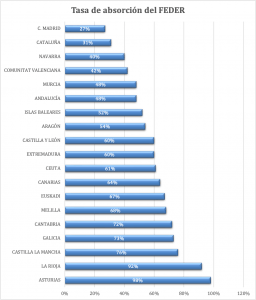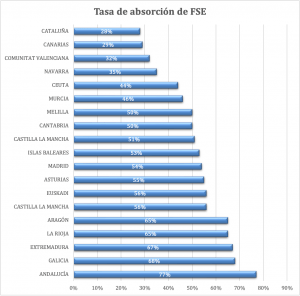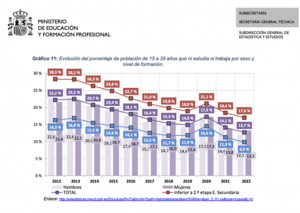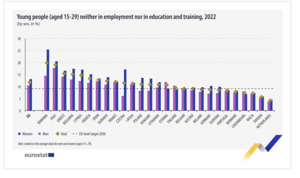- Spain has only been able to invest 57% of these funds
- La Rioja is the region that has absorbed the most funds, 80%.
- 900,000 young people aged 15-29 in Spain are neither studying nor working, 12.7% of the population in that age bracket
Spain has not yet executed 32,378 million euros of the 75,067 million euros that corresponded to it from the Structural and Investment Funds belonging to the 2014-2020 period. This means that this budget line either has no project yet or is part of a project that is not being implemented. Public data from the Directorate General for Regional and Urban Policy of the European Commission place Spain as the country with the worst absorption rate of funds in the entire European Union, as of 8 August.

Table 1: Comparison of the performance of countries with respect to the absorption rate of European Structural and Investment Funds. Source: European Commission.
On the other side of the scale is Portugal, which, with 93%, is the country that has executed the most funds. In addition, Portugal has earmarked an extra 10.78 billion euros for various projects.
The seriousness of the data lies not only in the amount or the percentage, but also in the fact that the deadline for absorbing the funds is 31 December of this year. Despite the fact that the Structural Funds have a rule (the n+3 rule) that allows project-related expenditure to be declared up to three years after the period, the state has barely five months to reverse the situation.
Juanma Revuelta, CEO of Finnova, points to several factors that explain the low absorption of funds, pointing to the lack of political focus on this issue. In this line, Revuelta states that there has been a lack of prioritization at government level at all levels, a fact that explains the low absorption rate of funds.
Another of the reasons Revuelta highlights is the scarcity of programmes to train public managers and civil servants in these areas, a fact that hinders the processing of aid. Revuelta acknowledges that the management of these funds is not a simple task, so “it is necessary to provide civil servants with the necessary tools so that they can properly carry out the procedures related to the aid”. Finally, Revuelta says that the public-private partnership instruments are not doing a good job of communicating the opportunities that European funds can offer citizens.
La Rioja, the region with the highest percentage of funds implemented
Taking into account the sum of the money granted through the European Agricultural Fund for Rural Development (EAFRD), the European Regional Development Fund (ERDF) and the European Social Fund (ESF), La Rioja is the community that has implemented more budget, reaching 80.02%. Moreover, La Rioja is the only region that exceeds the 75% absorption rate recorded on average by the EU-27. Asturias and Galicia are close to the European average, with absorption rates of over 70%. At the tail end of the statistics are Catalonia, Madrid and the Valencian Community, with rates of less than 50%.
Absorption rate of Structural and Investment Funds 2014-2020

Table 2: Comparison of the performance of the Autonomous Regions with respect to the absorption rate of the European Structural and Investment Funds. Source: European Commission, Prepared by: Finnova Foundation.
Breaking down the data for the funds analyzed, the best performance is to be found in the EAFRD, with an execution rate of 66%. In other words, of the 16,355 million euros granted to Spain, 10,767 million have been executed. Euskadi, with 79% of funds absorbed, is the community with the best absorption rate, followed by La Rioja and the Balearic Islands. On the other hand, the Canary Islands, Andalusia, Extremadura and Asturias accumulate the worst data. It is worth noting that eight regions (Andalusia, Navarre, Valencia, Catalonia, Extremadura, Castile-La Mancha, Aragon and Asturias) have not allocated the entire budget, with the Andalusian region having the highest percentage of unallocated money: 31%, or 1,041 million that have not been allocated.
Absorption rate of EAFRD
 Table 3: Comparison of the performance of the Autonomous Regions with respect to the absorption rate of the European Agricultural Fund for Rural Development. Source: European Commission, Prepared by: Finnova Foundation.
Table 3: Comparison of the performance of the Autonomous Regions with respect to the absorption rate of the European Agricultural Fund for Rural Development. Source: European Commission, Prepared by: Finnova Foundation.
With regard to the ERDF, it is the largest fund received by the State from the Structural and Investment Funds, with a budget allocation of 38,061 million euros, although only 20,537 million, or 54%, have been executed. Within the ERDF data, the two best absorption rates of the three funds analyzed can be found; Asturias, with 98% execution and La Rioja, with 92%, register these percentages. On the other hand, the Community of Madrid (27%), Catalonia (31%), Navarre (40%) and the Valencian Community (42%) are the territories with the worst data. There are four Autonomous Regions that have not allocated the entire budget (Madrid, Navarre, Castile and Leon, the Balearic Islands and Murcia). Madrid is the region with the highest percentage of unallocated funds, 26%, which, in absolute terms, translates into 314 million euros.
Absorption rate of ERDF

Table 4: Comparison of the performance of the Autonomous Regions with respect to the absorption rate of the European Regional Development Fund. Source: European Commission, Prepared by: Finnova Foundation.
Lastly, the ESF figures are the most concise: only 8,082 million of the 16,226 million granted to Spain have been implemented, almost 50% absorption. Andalusia stands out as the region with the best absorption rate, with 77%, followed by Galicia (68%) and Extremadura (67%). In contrast, Catalonia (28%), the Canary Islands (29%) and the Valencian Community (32%) do not reach a third of the executed budget. There are six territories that have not been allocated the entire budget: Navarre, the Canary Islands, Ceuta, Valencia, Murcia and the Balearic Islands. The region of Navarre has the highest percentage in this respect, with 52% of funds not allocated (40 million euros), although in absolute terms, the regions with the most money to allocate are the Canary Islands and the Valencian Community, with the figure reaching 175 million euros in both cases.
Absorption rate of ESF

Table 5: Comparison of the performance of the Devolved Regions with respect to the absorption rate of the European Social Fund. Source: European Commission, Prepared by: Finnova Foundation.
Structure of the EU budget
Regional executives will have to manage the money to be used from the European Structural Funds for the 2014-2020 period and for the 2021-2027 period, in addition to the projects approved through the Recovery and Resilience Mechanism (RRM). The RRM is the main tool of the NextGenerationEU (NGEU) funds, the temporary recovery instrument to support economic recovery from the coronavirus pandemic, and constitutes around 90% of the total NGEU budget. The Recovery and Resilience Facility provides grants and loans to support reforms and investments in EU Member States for a total value of EUR 723.8 billion. In order to receive funds under the RRM, Member States must develop recovery and resilience plans.
The NextGenerationEU funds, together with the European Union’s long-term budget, make up the EU Recovery Plan, the largest stimulus package ever funded in Europe. 2.018 trillion to help rebuild a greener, more digital, holistic and resilient post-COVID-19 Europe. The amount far exceeds the Marshall Plan, the US-led initiative for the recovery of Western Europe from the devastation of World War II, which had an original price tag of almost €13 billion (equivalent to €147 billion in today’s prices). This means that the sum of the NGEU funds and the Union’s long-term budget is a 13-fold increase of the well-known plan that contributed to the old continent’s economic recovery.
This framework is built to implement the energy and ecological transition. Brussels is looking for a neutral Europe by 2050, so any project to be implemented must be framed within this main objective.
Precisely these objectives that Brussels has set for itself are in line with the values of the Finnova Foundation. The foundation works for the constant commitment to business innovation and the excellence of applied knowledge through the development of talent and its international and interregional connection. To this end, Finnova offers the promotion of networks and events with the aim of raising awareness of the different funding channels of the European Union in the areas of environment, water, health, public works, energy efficiency, sustainable tourism, ICT and entrepreneurship.
Update on NGEU funds and the Partnership Agreement
Turning to the financing of the NextGenerationEU funds, in early June the Spanish government sent the addendum to the Recovery Plan sent in July 2021, an update of this document that will allow Spain to receive the remaining 94,300 million euros of the 140 billion euros that correspond to Spain from the NGEU. At the end of last year, Minister Calviño presented a first draft of this addendum, and the government has been working on this document with the autonomous communities, social agents and parliamentary groups, in order to present it before the deadline.
This update incorporates three important new features. First, the additional transfers corresponding to Spain are allocated, reaching a value of 7.7 billion euros. Secondly, the MRRF loans are also distributed, a framework from which Spain will be able to request up to a maximum of 84 billion euros from the European Commission. And finally, the destination of the funds of the REPowerEU Plan, which aims to save energy, increase the production of clean energy and diversify Europe’s energy sources, is fixed. In the provisional distribution of the fund, Spain has been provisionally allocated an additional 2,644 million euros.
With regard to the receipt of NGEU funds, Spain has received three payments to date, equivalent to 37 billion euros. In 2021, Spain received EUR 9 billion in pre-financing and EUR 10 billion corresponding to the first half-yearly payment from the EC. The second payment, amounting to 12 billion euros, was made at the end of July 2022, and the third payment of 6 billion euros was approved in February this year. The Executive is still working on the request for the fourth payment of 10 billion euros, a request that has yet to be made and is expected to be made in the last four months of this year.
Therefore, Spain has already received 37 billion from the NGEU, is preparing the application for 10 billion and has already approved the addendum to receive the remaining 94.3 billion. All this brings Spain’s total figure to 140 billion euros to be received from the NGEU funds, a figure that could even be increased to 160 billion.
In addition to these figures, the state reached an agreement with the European Commission called the Association Agreement, under which Spain will receive 36.682 billion euros of European funds for the period 2021-2027. The European Commission has approved this strategic document which includes the main lines of action and investment priorities of the European Regional Development Fund (ERDF), the European Social Fund Plus (ESF+), the European Maritime, Fisheries and Aquaculture Fund (EMFF) and the Just Transition Fund (FTJ).
Downward trend in the number of ninis
According to data published in January 2023 by the National Institute of Statistics, the percentage of young people aged 15 to 29 in Spain who neither study nor work stands at 12.7%, around 890,000 young people. Of this percentage, 12.1% are men, while 13.3% are women. Data published at the beginning of this year confirm a drop of 1.4% over the last year, and a decrease of 10 points over the last decade in the number of young people neither studying nor working.

Table 6: Evolution of the percentage of the population aged 15-29 who are neither studying nor working by sex and level of education. Source: Report on the use of the educational variables of the 2022 EAPS. Ministry of Education and Vocational Training.
Extrapolating the national data to the EU as a whole, Spain is the seventh country with the highest number of NEETs. Although the country has moved out of the top positions in this ranking (it was the fourth country with the highest number of NEETs in 2020), it is still far from the EU’s target of 9% of NEETs by 2030.

Table 7: Comparison of the percentage of NEETs in the EU Member States in 2022. Source: Eurostat.
About the Finnova Foundation
Finnova is the Spanish-Belgian non-profit foundation based in Brussels and Spain, working for the promotion and development of innovation and entrepreneurship in the EU. Finnova’s experience in leading communication and dissemination activities of European projects is combined with a strong proven track record in business creation and entrepreneurship support programmes, such as accelerators, incubators and events, as well as its commitment to training and employability of young people.

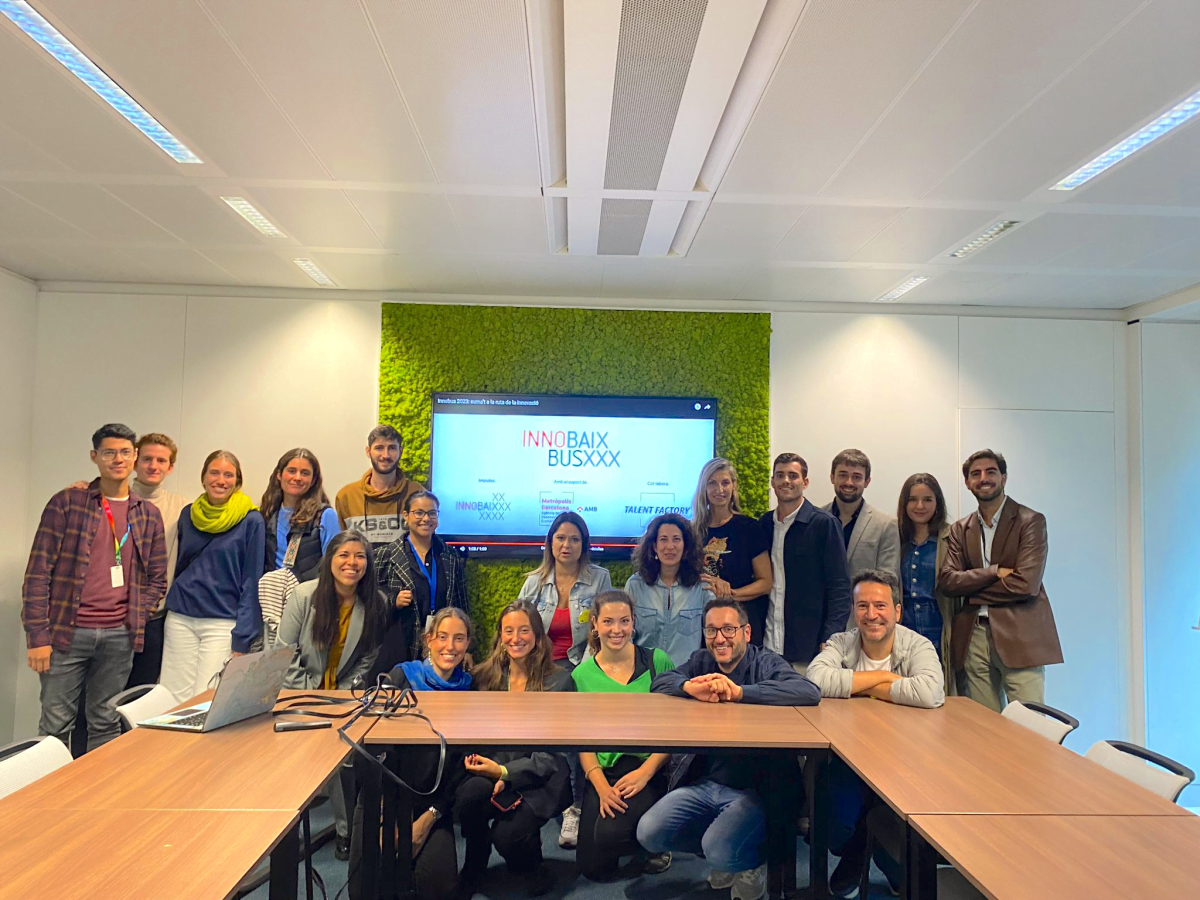
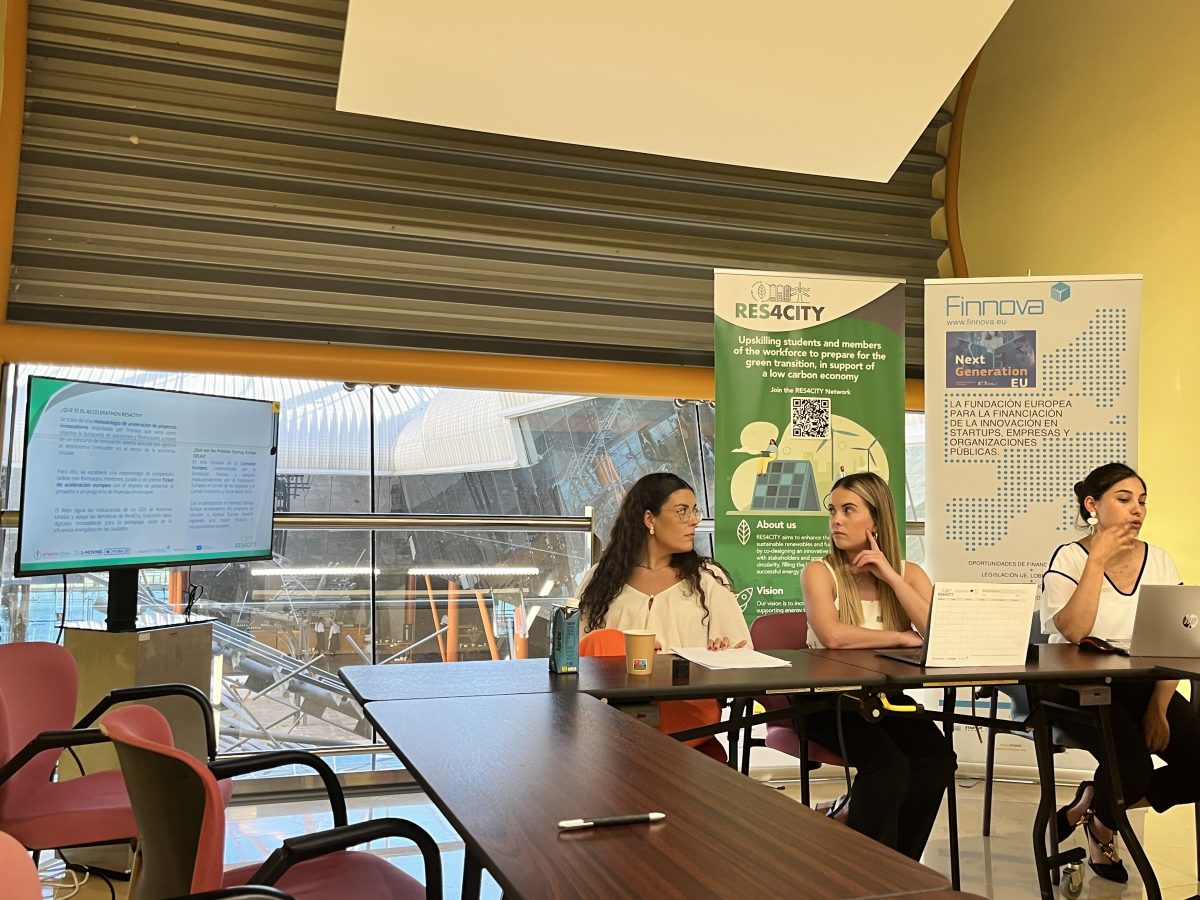

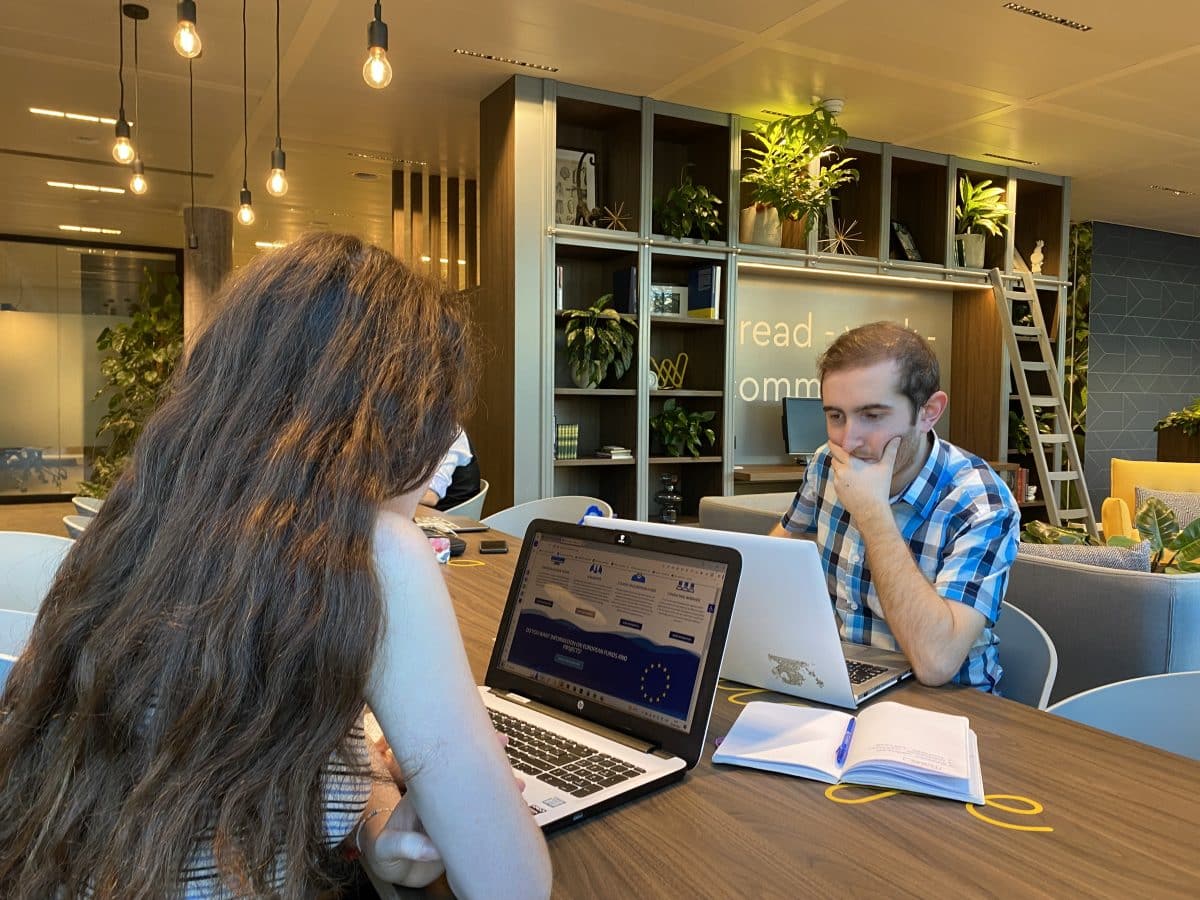
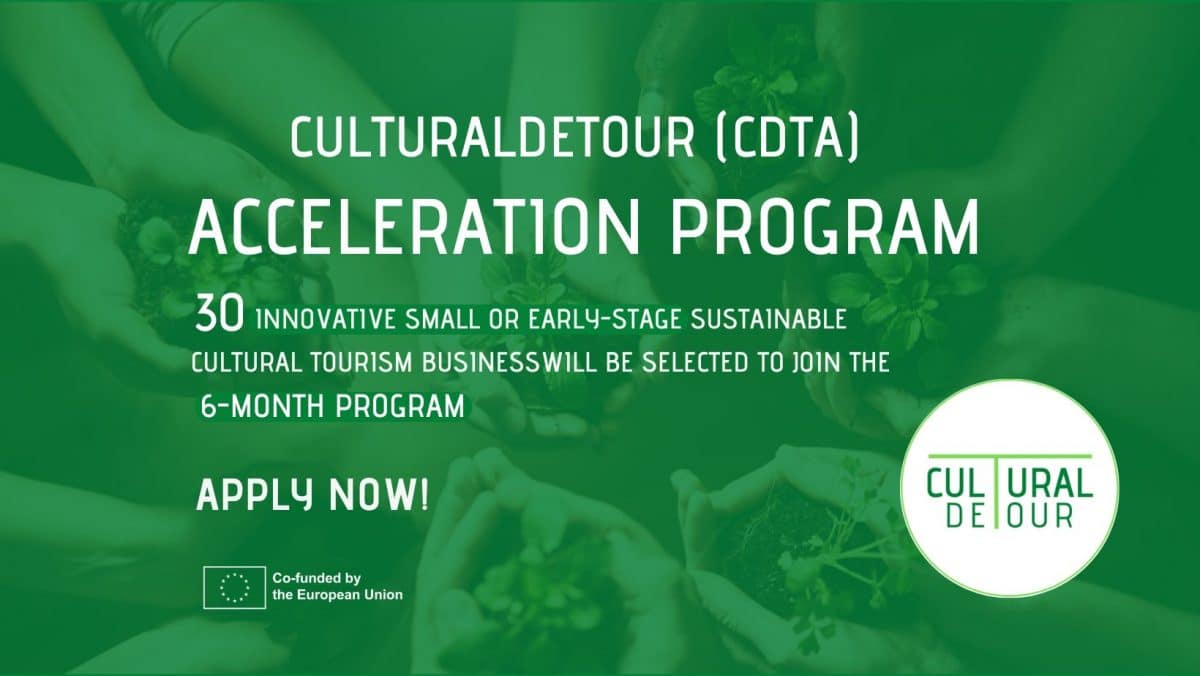
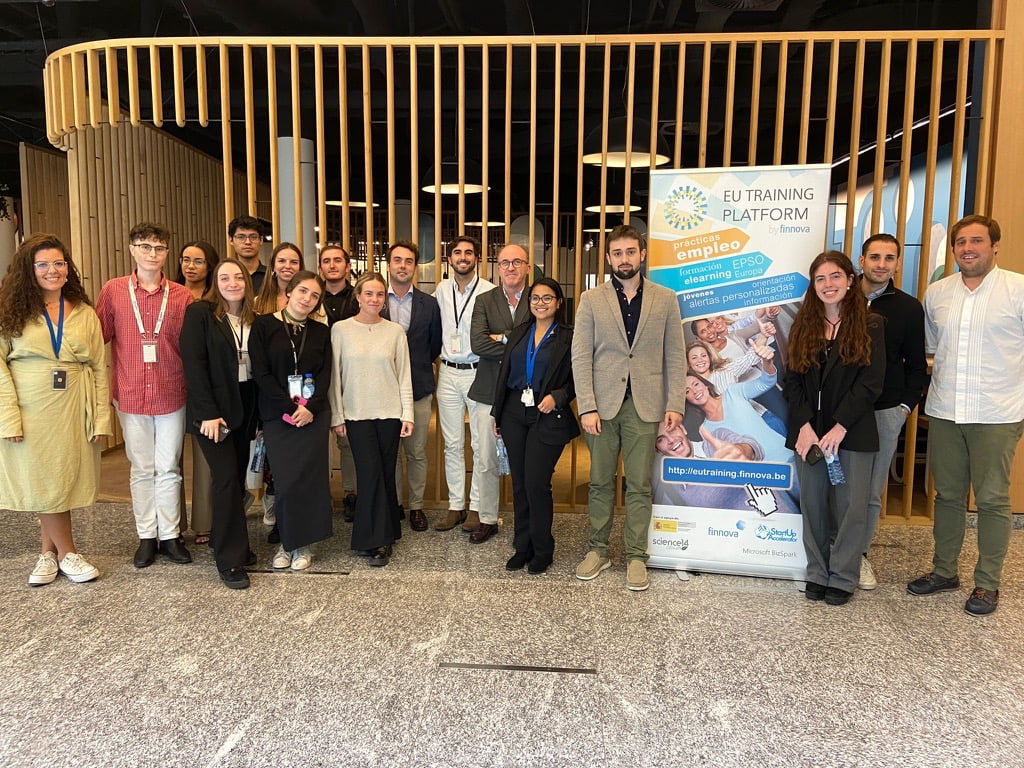



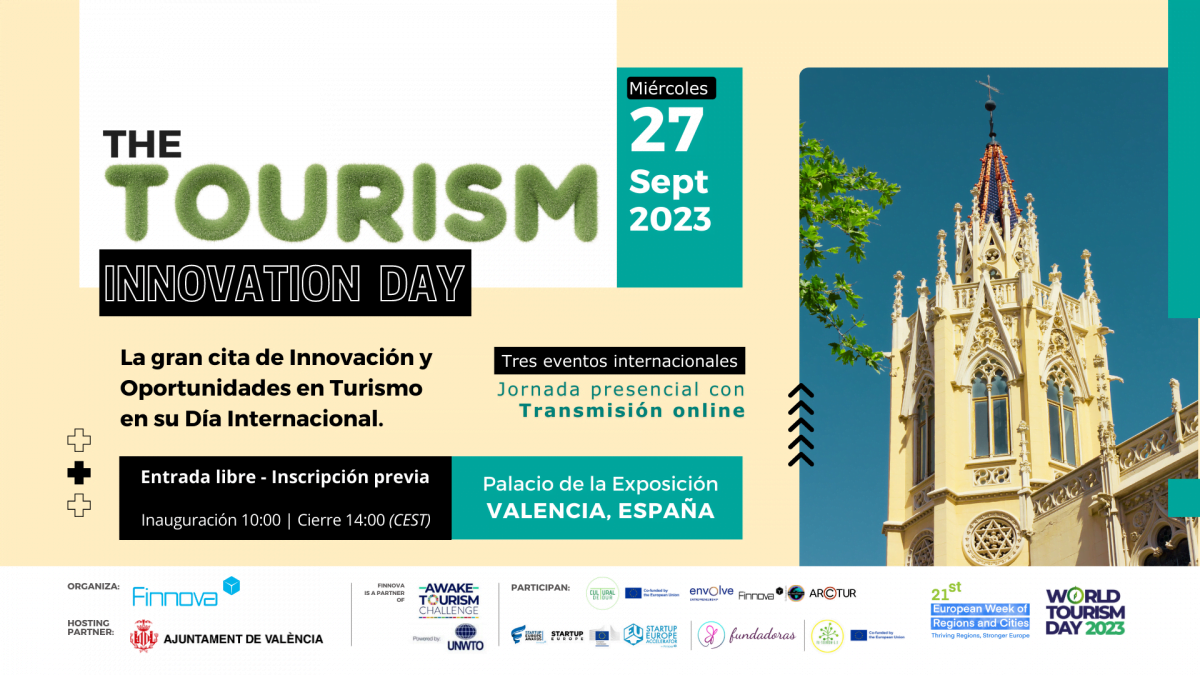
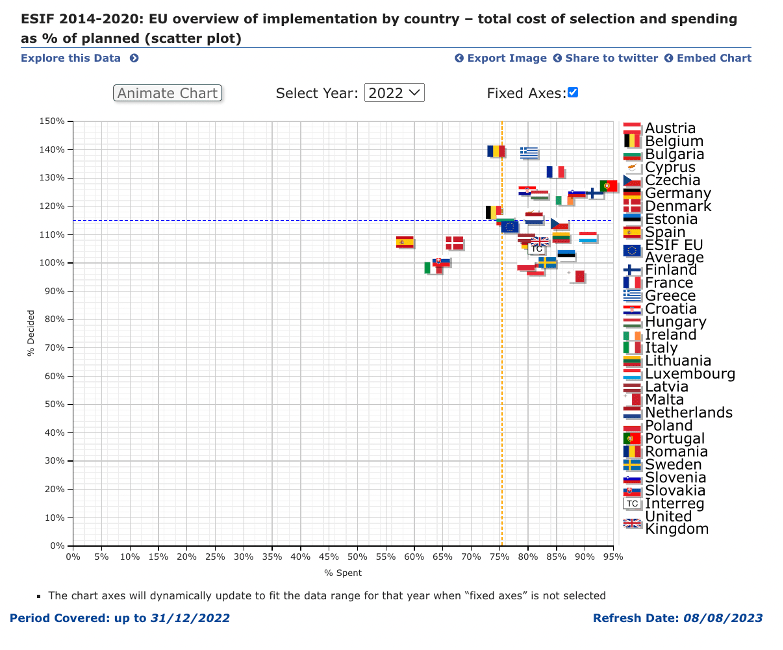
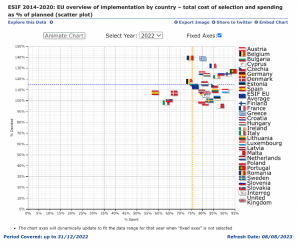
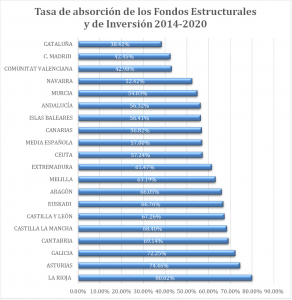
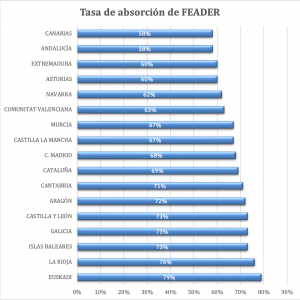 Table 3: Comparison of the performance of the Autonomous Regions with respect to the absorption rate of the European Agricultural Fund for Rural Development. Source:
Table 3: Comparison of the performance of the Autonomous Regions with respect to the absorption rate of the European Agricultural Fund for Rural Development. Source: 